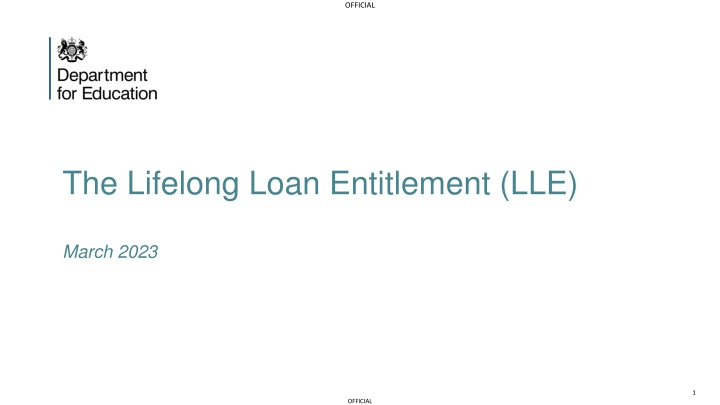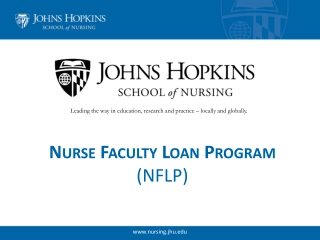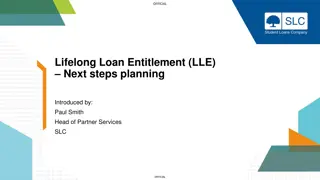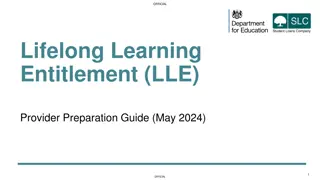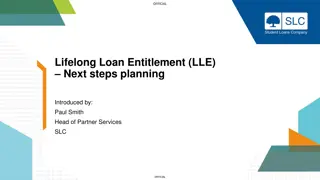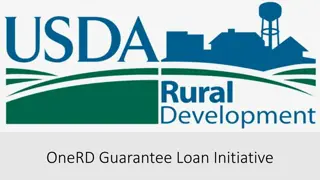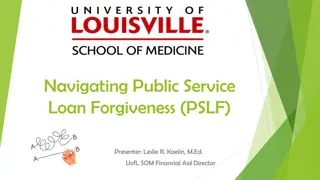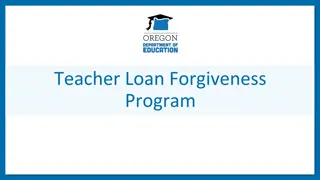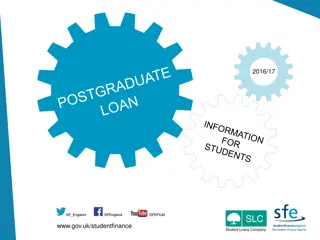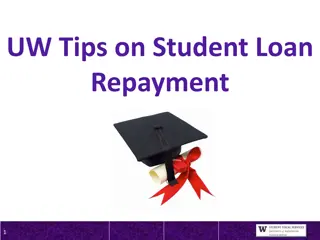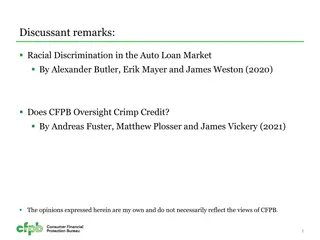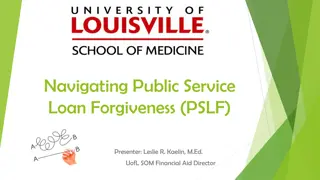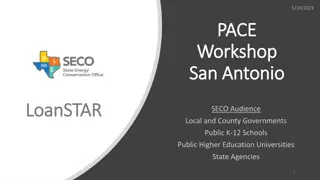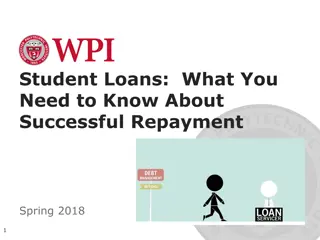Government's Lifelong Loan Entitlement Program Overview
The Lifelong Loan Entitlement (LLE) program, introduced by the Government, aims to transform access to high-quality learning for adults in England. Learners can access tuition funding for upskilling and retraining in Further and Higher Education from 2025. The program offers increased flexibility in choosing study modules and removes barriers to learning. This summary covers the key elements of the consultation response, entailing funding details, module quality requirements, and maintenance support enhancements.
Download Presentation

Please find below an Image/Link to download the presentation.
The content on the website is provided AS IS for your information and personal use only. It may not be sold, licensed, or shared on other websites without obtaining consent from the author.If you encounter any issues during the download, it is possible that the publisher has removed the file from their server.
You are allowed to download the files provided on this website for personal or commercial use, subject to the condition that they are used lawfully. All files are the property of their respective owners.
The content on the website is provided AS IS for your information and personal use only. It may not be sold, licensed, or shared on other websites without obtaining consent from the author.
E N D
Presentation Transcript
OFFICIAL The Lifelong Loan Entitlement (LLE) March 2023 1 OFFICIAL
OFFICIAL Lifelong Loan Entitlement (LLE) consultation and response The LLE was announced by the then Prime Minister in September 2020. Since then 1 2 The Department for Education ran a consultation on the LLE in February until May 2022. The consultation was aimed at anyone with an interest in post-18 education for adults in England. On 7 March 2023, the Government published a government response to the LLE consultation. This commitment to the LLE which will transform the way people access high quality learning and enable people to train, retrain and upskill over the course of their lifetime. consultation response reconfirms the Government s The consultation included 49 questions and was divided into three themes; 1) LLE Ambition, 2) Scope of the LLE and 3) Supporting Quality provision and flexible learning The following slides summarise the key elements of the response. 2 OFFICIAL
OFFICIAL 1. Overarching messages Through the LLE, the Government is seeking to create a unified student finance system for Further and Higher Education. From 2025, learners can access four years of tuition funding ( 37k in today s fees) to train, retrain and upskill throughout their lives. Higher education courses at levels 4 to 6, whether academic or technical, will be funded through the LLE. This will include: o Courses currently funded by HE student finance (e.g. undergraduate degrees, Higher Technical Qualifications); o Courses currently funded by Advanced Learner Loans (ALLs) with clear learner demand and employer endorsement; and o Post Graduate Certificates of Education (PGCEs), Integrated Masters, and Foundation Years part of a degree course. 3 OFFICIAL
OFFICIAL 2. Increased flexibility Through the LLE there will be increased flexibility for learners in how they choose to study, broadening access to funding for eligible modules, not just full courses. Making sure everyone can continue to access high quality education and training in a way that works for them at any stage of their life or their career is of upmost importance for this Government. Phased approach To ensure we get this right we will be taking a phased approach to introducing funding for modules starting from academic year 2025/26 with: o Higher Technical Qualifications o ALLs at levels 4 and 5 Ensuring module quality Modules must be from a single parentcourse that can be stacked towards full qualifications. Modules must be credit bearing, with a 30-credit minimum, which can be achieved by bundling Modules must have a single assigned academic level i.e. Level 4 Learners will receive a standardised transcript on completion Removing restrictions The Government will be removing unnecessary barriers to learning such as ELQ restrictions. Thismeans returning learners can train, retrain, and upskill based on their remaining loan entitlement, rather than prior qualifications achieved. 4 OFFICIAL
OFFICIAL 3. Entitlement, maintenance and repayments Entitlement Maintenance Repayments Individuals will have access to a loan entitlement worth the equivalent of four years of post-18 education funding ( 37,000 in today s fees) to allow them to train, retrain, and upskill. For the first time, under the LLE, we are expanding maintenance support to be offered across all eligible L4-6 technical and part- time courses on a par with traditional full-time study. Loans taken out for LLE courses and modules will be repaid under Plan 5 terms and conditions, with a 9% repayment rate paid on incomes above 25,000. Excluding postgraduate loans, learners will not be required to repay more than 9% of their income above thresholds even if they have loans under Plan 5 and Plan 2 (post-2012 loans). The Government will be offering this four-year entitlement to both new, and returning learners (who will have access to a residual entitlement). A reduced-rate maintenance loan will continue to be available for those over 60 the relevant LLE tuition fee loans will be available up to the age of 60. An additional entitlement, above the core four-year entitlement, will be made available for a limited number of priority subjects and longer courses. 5 OFFICIAL
OFFICIAL 4. Personal account Learners will be able to access their LLE through an online personal account where they can easily view: Their loan entitlement Clear information and guidance Eligible courses This will help support learners make informed choices about their learning pathway. How the account looks and its wider functionality, such as the ability to record a learner s record of achievement, will be subject to user research and testing, so that the account is user friendly and simple to use. Figure 1. Example of a personal account for a learner accessing their LLE 6 OFFICIAL
OFFICIAL 5. Quality and regulation Approach: Regulation of the LLE will be delivered through the OfS who will seek to develop a permanent 3rd registration category for providers currently offering L4-6 Advanced Learner Loan (ALL) provision, but who aren t currently registered with the OfS. All providers not currently accessing ALL or HESF funding for the delivery of level 4 to 6 courses, who want to deliver LLE-funded provision from academic year 2025/26 onwards, will be able to apply to the existing two registration categories at any stage. Appropriate regulation: The Government expects that OfS will continue to regulate providers in a proportionate way, as they currently do and will support the OfS in ensuring the regime is clear. Next steps: The OfS will be consulting later in the year (2023) on the conditions of this new category. 7 OFFICIAL
OFFICIAL 6. Credit transfer and fee limits Credit transfer Fee limits The Government will not impose credit transfer arrangements, but instead seek to facilitate credit transfer through other methods. Although already announced ahead of the consultation response, on the 1 Feb 23 the Lifelong Learning (Higher Education Fee Limits) Bill was introduced into parliament. This will include through: introducing the requirement for providers to provide a standardised transcript on completion of modules personal account functionalities where possible e.g. information, advice and guidance. This bill will create a system for applying fee limits to courses and modules offered by providers in the OfS Approved (Fee Cap) category, to ensure that fees are proportionate, fair, and consistent across both full courses and modular, more flexible study. o o 8 OFFICIAL
OFFICIAL Next steps The next steps in the pathway to the LLE are: Publish in Autumn 2023 - courses eligible for additional entitlement and the principles for the calculation of residual entitlement Work with providers of Advance Learner Loans (ALLs) to embed changes OfS will consult on the development and introduction of a new third registration category Publish an update on Alternative Student Finance (ASF) by late 2023. Launch a technical consultation on wider expansion of modular funding next year Successful delivery and implementation of the LLE will require a significant culture shift from providers, learners and employers. Stakeholder engagement and communication will play a pivotal role in achieving this and we are keen to continue engaging in a dialogue with stakeholders. In particular, we are keen to accelerate sector readiness, and work with providers to identify trailblazers and case studies we can use to champion LLE as we seek to highlight best practice. Any questions? 9 OFFICIAL
